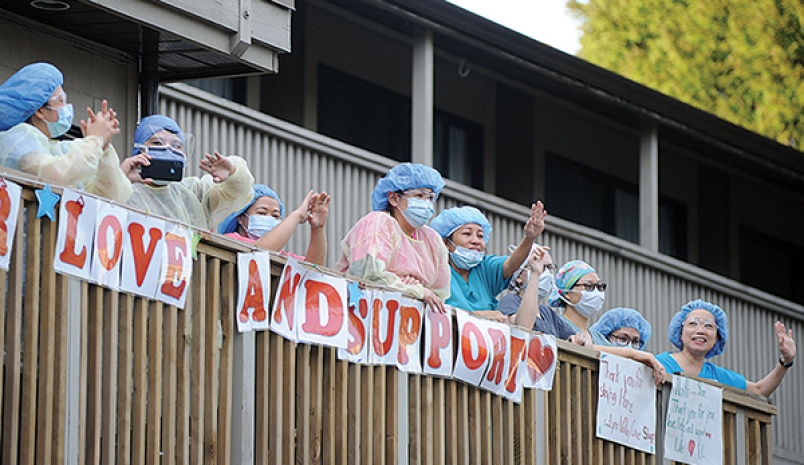Early signs were that British Columbia could flatten the curve—but what can we learn from today’s spiking SARS-CoV-2 infection rates?
On March 7th, B.C.’s first COVID-19 outbreak in a long term care was reported at Lynn Valley Care Center. Shortly thereafter restrictions in care homes across the province would be introduced. At the peak of the COVID-19 pandemic in B.C., there were 22 seniors’ care residences with active cases of COVID-19. As of early September, there were also t least 10 active outbreaks in long-term care or assisted living with over 40 outbreaks declared over. According to Sept. 4th data from the B.C. Ministry of Health, since the first case of COVID-19 was reported in the province in late January, over 700 people have reported sick in health care settings (mostly in long-term care), including 291 staff.

In terms of overall deaths, the worst outbreak in B.C. was reported at the Langley Lodge in the Fraser Health region with 26 deaths, followed by Holy Family Hospital in Vancouver Coastal with over twenty fatalities.[i] As late as July 20, the death rate in BC long term care homes was about 72 per cent of the provincial total. According to modeling data provided by the BC Ministry of Health in July about twenty percent of cases of COVID-19 that resulted from outbreaks at B.C.’s long-term care homes were fatal, which is significantly higher than B.C.’s overall fatality rate of 6.1 per cent.[ii]
While these figures are high and alarming, including that almost 70 percent of deaths have occurred in long term care, B.C. has fortunately not seen the type of death rates in Ontario and Quebec where the numbers are in the thousands. Ontario, for example, as of late May had registered outbreaks in 280 facilities with approximately 1,500 deaths, while Quebec had 2,000 deaths recorded throughout 270 facilities. It is difficult to say why B.C. has been somewhat more successful than other jurisdictions, thus far, in limiting the spread of COVID-19 within its care homes. As outlined in its earlier 2021 BC Care Providers Association (BCCPA) Budget Submission, potential factors, however, may include:
- Less community spread, reducing the chances staff will become infected and bring the virus into seniors homes;
- Early proactive measures, including restricting visitors as well as issuing an order to limit staff to work at one care home;[iii]
- Newer care homes with fewer number of multi-bedrooms[iv] compared to Ontario and Quebec;
- An early emphasis on seeking and distributing PPE, including a proactive approach by SafeCare BC to collect, centralize and distribute PPE;[v]
- Health authority and provincial measures including protocols for testing staff and residents as well as the deployment of active rapid response teams; and
- Quickly pivoting to existing protocols, designed to protect residents from influenza and other respiratory illnesses and adapted them in concert with health authorities.[vi]
As outlined above, one reason for the lower rates in long term care compared to other jurisdictions in Canada is lower infection rates in the community. A study released in July, for example, suggests that although eight times as many people in Metro Vancouver have been infected by COVID-19 than the rate of reported cases with findings indicating a successful suppression of community transmission, including an estimated overall infection rate of less than one per cent.[vii] As outlined at the time by the B.C. Centre of Disease Control B.C. has among the lowest per capita case and death rates in North America.[viii]
A July 2020 Canadian Foundation for Healthcare Improvement report also highlighted where B.C. performed relatively well including that the province was able to respond well to even the early outbreaks via its regional health authorities. In particular, according to interviewees they indicated that regional authorities tended to be able to move resources to care homes more quickly for either protection or response. It also highlighted the role of “SWAT Teams” that were developed in regions.[ix]
While B.C. might be seen as a relative success story so far in bending the curve including having one of the lowest per capita COVID-19 death rates, there have still been numerous challenges. For example, along with having high death rates in long term care where about two thirds total deaths have occurred, B.C. has faced significant challenges related to staffing levels as well as access to personal protective equipment (PPE). This BC panel of various experts at the BCCPA Virtual Conference will discuss such issues including what has transpired in BC since the beginning of the pandemic as well as some of the challenges and successes related to COVID-19.
Likewise, the panel will discuss the future for seniors care and living, including staffing, in British Columbia as we continue deal with COVID-19 and possibly future pandemics. The live panel titled Seniors Care and COVID-19: A BC Success Story? to held at the BCCPA Virtual Conference on September 25th will be moderated by Mike Klassen, VP Public Affairs, as well as have seniors care experts across the province, including:
- Roger Wong, Vice Dean (Education) & Clinical Professor, Division of Geriatric Medicine, Faculty of Medicine, University of British Columbia;
- Michael Schwandt, Medical Health Officer, Vancouver Coastal Health;
- Jennifer Lyle, Chief Executive Officer, SafeCare BC; and
- Kiersten Fisher, Executive Director, Seniors Services Specialized Services Division, Ministry of Health
END NOTES
[i] Vancouver Province. COVID-19: Outbreaks declared at Holy Family Hospital, Burnaby Hospital. September 8, 2020. Accessed at: https://theprovince.com/news/covid-19-fresh-outbreak-at-holy-family-hospital-in-vancouver-where-21-died/wcm/b0487aa6-3dc4-4275-917e-c531e657d081/
[ii] BC Ministry of Health. COVID-19: Going Forward. BC Modeling update, July 20, 2020. Accessed at:
https://news.gov.bc.ca/files/Covid19-Modelling_Update.pdf
[iii] On March 25, 2020 following an order by Provincial Health Officer Dr. Bonnie Henry workers in British Columbia’s long-term care, acute care and assisted-living facilities were limited to working in a single facility. To access medical order see: https://www2.gov.bc.ca/assets/gov/health/about-bc-s-health-care-system/office-of-the-provincial-health-officer/reports-publications/covid-19-pho-order-info-collection-health-care-staff.pdf
[iv] In BC about 88% of rooms are single occupancy, 8% double occupancy and 4% multi-person rooms. Source: Office of Seniors Advocate. Monitoring Seniors Services, 2019. December 2019. Accessed at: https://www.seniorsadvocatebc.ca/app/uploads/sites/4/2019/12/MonitoringReport2019.pdf
[v] CBC News. The long-term care crisis: How B.C. controlled COVID-19 while Ontario, Quebec face disaster. March 28, 2020. Accessed at: https://www.cbc.ca/news/politics/long-term-care-crisis-covid19-pandemic-1.5589097
[vi] That included restricting outside visitors, limiting community activities and implementing enhanced cleaning and sanitation measures. Any residents demonstrating signs of illness were tested immediately for COVID-19 and quarantined for 14 days, erring on the side of caution. [Source: Vancouver Sun. Coordinated “Team B.C.” approach has made the province a model for seniors’ care during COVID-19. May 30, 2020. Accessed at: pandemic. Accessed at: https://vancouversun.com/sponsored/news-sponsored/coordinated-team-b-c-approach-has-made-the-province-a-model-for-seniors-care-during-covid-19-pandemic/wcm/bc89e787-18ea-47ff-9ed1-1b2edbeeb6fd/]
[vii] MedRxIV. Low SARS-CoV-2 sero-prevalence based on anonymized residual sero-survey before and after first wave measures in British Columbia, Canada, March-May 2020. Accessed at:
https://www.medrxiv.org/content/10.1101/2020.07.13.20153148v1
[viii] Times Colonist. B.C. COVID-19 infection rate among lowest on continent. July 16, 2020. Accessed at: https://www.timescolonist.com/news/local/b-c-covid-19-infection-rate-among-lowest-on-continent-study-1.24171983
[ix] Canadian Foundation for Health Care Improvement. Reimaging Care for Older Adults, Next Steps in COVID-19 Response in Long-Term Care and Retirement Homes. July 2020. Accessed at:





